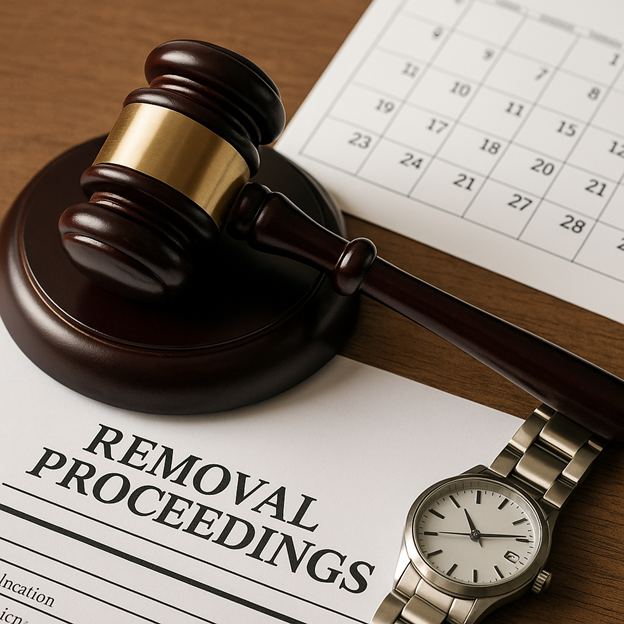
Immigration Judges Told Not to Delay Hearings for Speculative Relief: Matter of J-A-F-S- (BIA 2025)
Authority: Board of Immigration Appeals (BIA)
Key takeaway: Immigration Judges generally should not postpone final hearings when the immigrant only speculates that they might qualify for a new form of relief, especially if the claim is raised at the last minute.
The Background
The respondent, a man in removal proceedings since 2015, had already filed for asylum and later asked for time to pursue prosecutorial discretion. His final hearing was rescheduled multiple times, including once due to his lawyer’s unavailability.
Just before his June 2025 hearing, he filed another motion to delay, claiming he had recently been abused by his wife and might qualify for special rule cancellation of removal for battered spouses under U.S. immigration law (INA § 240A(b)(2)(A)).
At the hearing, his lawyer said they needed more time to gather evidence and decide whether to apply for this relief. The Department of Homeland Security (DHS) opposed the continuance, pointing out that:
- He hadn’t actually filed an application for cancellation.
- He hadn’t provided evidence of marriage to a U.S. citizen or resident spouse.
- His criminal record—including a 2023 conviction for spousal battery, false imprisonment, and related charges—would likely prevent him from qualifying.
- The case had already been pending for nearly 10 years.
Despite this, the Immigration Judge granted the continuance. DHS appealed.
The Legal Question
The issue was:
Should an Immigration Judge postpone a hearing when the immigrant claims, at the last minute, that they might qualify for a new form of relief, but provides little or no evidence?
The BIA’s Decision
The Board sided with DHS and overturned the Immigration Judge’s decision. It emphasized several key points:
-
Good cause is required for continuances.
Judges may delay a case only if there is a reasonable likelihood that the immigrant will succeed in applying for new relief and that the relief would change the outcome of the case. -
Speculation is not enough.
The respondent did not file a cancellation application, did not submit supporting documents, and did not show a clear likelihood of eligibility. Simply saying “I might qualify” is not good cause. -
Diligence matters.
The respondent had been in removal proceedings for a decade but only raised this new claim right before his hearing. Judges expect immigrants and lawyers to explore relief options early in the process, not at the last minute. -
Efficiency and fairness.
Continuances burden the court system, waste resources, and delay final decisions. Immigration Judges have a duty to bring cases to a timely close. -
Criminal history.
Because of the respondent’s criminal convictions, even if he applied for special rule cancellation, he was unlikely to qualify as someone of “good moral character” or to merit a favorable discretionary decision.
Outcome
- The BIA sustained DHS’s appeal.
- The continuance was vacated (cancelled).
- The case was sent back to the Immigration Judge with instructions to promptly schedule a final hearing to decide any relief that was properly before the court.
What This Means
- For immigrants: You can’t delay your immigration hearing just by saying you might qualify for something new. You need to show a realistic chance of eligibility with evidence. Waiting until the last minute is risky.
- For lawyers: Diligence is critical. Relief options must be identified and raised as early as possible, with supporting applications and documents filed before the individual hearing.
- For the courts: This decision reinforces the principle of efficiency. Immigration Judges must carefully scrutinize late requests for delay, especially when based on speculative or undeveloped claims.
Bottom Line
In Matter of J-A-F-S- (2025), the BIA ruled that continuances should not be granted based on speculative, last-minute claims of new relief. Immigration Judges must prioritize timely resolution of cases and require immigrants to show real evidence that new relief is available and likely to succeed.
Let’s Get Started
Your legal challenges deserve personalized attention and innovative solutions. Contact Oware Justice Advocates PC today for a consultation and take the first step toward resolution and peace of mind.
355 South Teller Street, Suite 204,
Lakewood, CO 80226
(Visits to the office are strictly by appointment only)
303-514-6589

